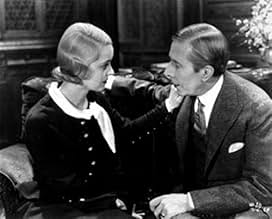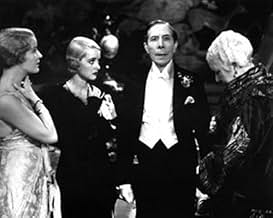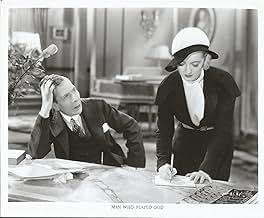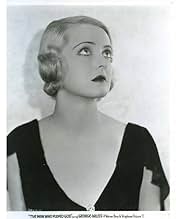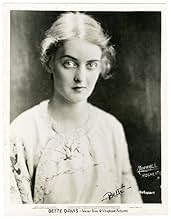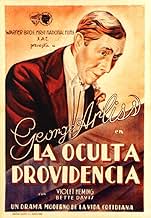NOTE IMDb
6,8/10
1,4 k
MA NOTE
Ajouter une intrigue dans votre langueAfter losing his hearing, a musician uses lip-reading to help others.After losing his hearing, a musician uses lip-reading to help others.After losing his hearing, a musician uses lip-reading to help others.
- Réalisation
- Scénario
- Casting principal
- Récompenses
- 1 victoire au total
George Arliss
- Montgomery Royle
- (as Mr. George Arliss)
André Luguet
- The King
- (as Andre Luguet)
Ivan F. Simpson
- Battle
- (as Ivan Simpson)
Charles E. Evans
- The Doctor
- (as Charles Evans)
Fred Howard
- Man
- (scènes coupées)
Symona Boniface
- Woman in Audience
- (non crédité)
Wade Boteler
- Detective
- (non crédité)
Elspeth Dudgeon
- Would-Be Ticket Buyer
- (non crédité)
Grace Durkin
- Kit - First Girl
- (non crédité)
Helena Phillips Evans
- Music Fan with Boy
- (non crédité)
Avis à la une
First and foremost, "The Man Who Played God" (1932) is not a Bette Davis vehicle. She was still a few years away from receiving top billing and graduating into 'A' pictures. However, the mere fact that she's in this overlooked and forgotten film will only push it into wider circulation and rapidly increase its number of viewers. So much has already been said about her, there's very little one can add to further compliment her. Personally, I think she gave some of her best performances in these early 1930s B programmers for Warner Bros. Sure, the material wasn't nearly as good, which only made her performances stand out all the more. But Bette Davis has little to do with what stands out about this movie.
After losing his hearing, a well-loved and respected piano player (George Arliss) becomes a recluse. He rejects most of his old friends and companions, and is cruel to the few he does see. He learns to read lips, but grows more and more depressed at the same time. And finally when he has hit rock bottom, he finds a purpose in his life,... philanthropy. Putting aside his own problems and selfishness, his salvation comes from helping others. This is a theme that would recur over and over again to varying degrees in the Depression era 30s (especially in Frank Capra's movies).
The other thing of interest here is the act of voyeurism. Through the aid of binoculars, he's able to read lips, and essentially, spy on everyday New Yorker's. One can't help but wonder if this little movie may have had some influence or have been the basis for the idea of Cornell Woolrich's short story "It Had to Be Murder", which would be eventually adapted into Alfred Hitchcock's "Rear Window" (1954).
This movie, is, by no means a masterpiece, but its still an important one. With so many interesting ideas going on here, its well worth the watch.
After losing his hearing, a well-loved and respected piano player (George Arliss) becomes a recluse. He rejects most of his old friends and companions, and is cruel to the few he does see. He learns to read lips, but grows more and more depressed at the same time. And finally when he has hit rock bottom, he finds a purpose in his life,... philanthropy. Putting aside his own problems and selfishness, his salvation comes from helping others. This is a theme that would recur over and over again to varying degrees in the Depression era 30s (especially in Frank Capra's movies).
The other thing of interest here is the act of voyeurism. Through the aid of binoculars, he's able to read lips, and essentially, spy on everyday New Yorker's. One can't help but wonder if this little movie may have had some influence or have been the basis for the idea of Cornell Woolrich's short story "It Had to Be Murder", which would be eventually adapted into Alfred Hitchcock's "Rear Window" (1954).
This movie, is, by no means a masterpiece, but its still an important one. With so many interesting ideas going on here, its well worth the watch.
An aging & celebrated concert pianist completely loses his hearing, and with it his faith in The Almighty. After learning to lip read, he realizes he can once again enter into people's lives, alleviating the misfortunes of total strangers. With this much power to do good, he becomes THE MAN WHO PLAYED GOD.
Although sadly neglected today, George Arliss was one of the very greatest of film actors of the 1930's. His art was consummate - a whole volume of emotion could be conveyed by the slightest movement of face or posture. He gives a wonderful performance here as a man torn from what he loves the most, blaming God for it and eventually finding peace.
A splendid actress of the same period, Louise Closser Hale gives quiet dignity to the role of Arliss' sister. As his protégé, young Bette Davis does a fine job; she always considered this to be her first film role of substance. Ivan F. Simpson is excellent as a very loyal butler. Hedda Hopper has a tiny role as a woman at a picnic & look for an uncredited Ray Milland as a young man in Central Park attempting suicide.
Although sadly neglected today, George Arliss was one of the very greatest of film actors of the 1930's. His art was consummate - a whole volume of emotion could be conveyed by the slightest movement of face or posture. He gives a wonderful performance here as a man torn from what he loves the most, blaming God for it and eventually finding peace.
A splendid actress of the same period, Louise Closser Hale gives quiet dignity to the role of Arliss' sister. As his protégé, young Bette Davis does a fine job; she always considered this to be her first film role of substance. Ivan F. Simpson is excellent as a very loyal butler. Hedda Hopper has a tiny role as a woman at a picnic & look for an uncredited Ray Milland as a young man in Central Park attempting suicide.
"Of Human Bondage," (1934) by RKO, to whom Bette Davis was 'loaned' by Warner Brothers, is most often given credit for the beginning of the Queen of the Silver Screen's magnificent acting career. That's not the historical fact, however; this movie, "The Man Who Played God," (1932) must be credited for bringing Bette Davis the recognition as an actor who could hold her own in the lead next to the great screen legend, George Arliss.
Davis was only 23 years of age when filming the show that earned her enough screen status for RKO to even desire her to play the leading, (dare I say) 'lady' next to leading man, Leslie Howard in "...Bondage." Arliss is to be credited for having, more or less, discovered Bette Davis; phoned her & the rest of her acclaimed acting career began.
So many of the critiquers repeat the myth that "... Bondage" is the film that made the world recognize how great an actor Davis was. But, if it was, RKO would have never even wanted her so badly that they 'got her on loan' from the Warners! RKO recognized the talent of Bette Davis in this film: "The Man Who Played God." So should we.
Never underestimate what young adult & teen women can achieve. After all, Mary Shelley wrote "Frankenstein," when she was only 19 years of age in a bet with great poets, Lord Byron & her husband Percy Bysche Shelley. Ann & Nancy Wilson of the rock band "Heart," composed many of their best songs when they were 13 years of age! Davis had already been on Broadway before taking her role in this movie. In fact, her acting career began when she was 15 (in 1923). Davis went on (& on!) to co-lead with Lillian Gish in "Whales of August," (1987), having been in over 100 movies; was the first woman to receive an Oscar at Warner Brothers (for "Dangerous"); the first person to be nominated for an Oscar 5 years in a row; the first woman to receive the AFI's Lifetime Achievement Award; the first person to be nominated for 10 Oscars; the highest paid woman during her prime. She was the epitome of a trail blazer who had to do it "the hard way."
Today, Robert Wagner, Miss Davis's son, Michael, & Miss Davis's closest assistant are key figures who keep Bette Davis's acting excellence alive, through the foundation named after her. Meryl Streep was the first actor to benefit from Davis's foundation. Obviously, the foundation board is taking Davis's acting acumen as a serious measure by which to select recipients of foundation awards & scholarships. Davis herself was the one to recognize Streep's acting abilities.
That's what kind of lady she was: she'd take a step back on the set to boost someone else's acting career; she'd take steps forward to seek out great scriptwriters, directors, cinematographers, etc. She strove to not only circulate her own gifts, but wanted to help others people do so with theirs--and still does so. Her reputation on the set was not as a "star," struck with ego maniacal lights in her fabulously expressive eyes. Instead, she was known to be a pleasure to work with amongst the team workers; and a real tough lady to contend with when she sensed something was amiss in a line, scene, lighting, direction, or co-worker. But, as Robert Wagner tells of Davis, she was truly a fun person to work with because she "always" came to work prepared to put on her very best performance. And when she goofed, she did so with a kind of cute humility that was full of wit enough to crack-up the co-workers she liked.
There's a huge difference between striving for perfection and believing we're perfect. Davis did the former. By the way, she gave her "Jezebel" Oscar to her son, Michael. Steven Spielberg bought her "Dangerous" one that was auctioned (for the second highest price ever) to benefit her foundation. This says to me that Davis herself knew she'd really earned her "Jezebel" Oscar; whereas it was no secret that the masses believed she got the "Dangerous" Oscar as a "consolation prize" for not even being nominated for, "Of Human Bondage."
By my standards, Davis was robbed of her third Oscar for playing the role of Charlotte Vale in "Now, Voyager." In Davis's mind, she was robbed of (what would have been her fourth) Oscar for playing Baby Jane Hudson in, "What Ever Happened to Baby Jane?"
Davis herself credited George Arliss & this movie for jump starting her into untouchable acting achievements. This movie is the movie to own if we want to say we've got a copy of Bette Davis's first great one.
Davis was only 23 years of age when filming the show that earned her enough screen status for RKO to even desire her to play the leading, (dare I say) 'lady' next to leading man, Leslie Howard in "...Bondage." Arliss is to be credited for having, more or less, discovered Bette Davis; phoned her & the rest of her acclaimed acting career began.
So many of the critiquers repeat the myth that "... Bondage" is the film that made the world recognize how great an actor Davis was. But, if it was, RKO would have never even wanted her so badly that they 'got her on loan' from the Warners! RKO recognized the talent of Bette Davis in this film: "The Man Who Played God." So should we.
Never underestimate what young adult & teen women can achieve. After all, Mary Shelley wrote "Frankenstein," when she was only 19 years of age in a bet with great poets, Lord Byron & her husband Percy Bysche Shelley. Ann & Nancy Wilson of the rock band "Heart," composed many of their best songs when they were 13 years of age! Davis had already been on Broadway before taking her role in this movie. In fact, her acting career began when she was 15 (in 1923). Davis went on (& on!) to co-lead with Lillian Gish in "Whales of August," (1987), having been in over 100 movies; was the first woman to receive an Oscar at Warner Brothers (for "Dangerous"); the first person to be nominated for an Oscar 5 years in a row; the first woman to receive the AFI's Lifetime Achievement Award; the first person to be nominated for 10 Oscars; the highest paid woman during her prime. She was the epitome of a trail blazer who had to do it "the hard way."
Today, Robert Wagner, Miss Davis's son, Michael, & Miss Davis's closest assistant are key figures who keep Bette Davis's acting excellence alive, through the foundation named after her. Meryl Streep was the first actor to benefit from Davis's foundation. Obviously, the foundation board is taking Davis's acting acumen as a serious measure by which to select recipients of foundation awards & scholarships. Davis herself was the one to recognize Streep's acting abilities.
That's what kind of lady she was: she'd take a step back on the set to boost someone else's acting career; she'd take steps forward to seek out great scriptwriters, directors, cinematographers, etc. She strove to not only circulate her own gifts, but wanted to help others people do so with theirs--and still does so. Her reputation on the set was not as a "star," struck with ego maniacal lights in her fabulously expressive eyes. Instead, she was known to be a pleasure to work with amongst the team workers; and a real tough lady to contend with when she sensed something was amiss in a line, scene, lighting, direction, or co-worker. But, as Robert Wagner tells of Davis, she was truly a fun person to work with because she "always" came to work prepared to put on her very best performance. And when she goofed, she did so with a kind of cute humility that was full of wit enough to crack-up the co-workers she liked.
There's a huge difference between striving for perfection and believing we're perfect. Davis did the former. By the way, she gave her "Jezebel" Oscar to her son, Michael. Steven Spielberg bought her "Dangerous" one that was auctioned (for the second highest price ever) to benefit her foundation. This says to me that Davis herself knew she'd really earned her "Jezebel" Oscar; whereas it was no secret that the masses believed she got the "Dangerous" Oscar as a "consolation prize" for not even being nominated for, "Of Human Bondage."
By my standards, Davis was robbed of her third Oscar for playing the role of Charlotte Vale in "Now, Voyager." In Davis's mind, she was robbed of (what would have been her fourth) Oscar for playing Baby Jane Hudson in, "What Ever Happened to Baby Jane?"
Davis herself credited George Arliss & this movie for jump starting her into untouchable acting achievements. This movie is the movie to own if we want to say we've got a copy of Bette Davis's first great one.
Although George Arliss made several of the roles he did on stage into films both sound and silent The Man Who Played God was not one of them. Another stage legend Otis Skinner originated that role on Broadway although Arliss filmed it twice both as a silent and with sound.
We can only speculate about what Skinner did with the part, but Arliss because we have him on film can truly be said to make the part his own. His is a style that many find old fashioned, but I find most compelling when he's performing.
The story is that of a famous concert pianist who was born into a wealthy family so he's never in danger of missing a meal. A bomb set off at a private performance has left him stone deaf and in a great deal of despair. But he learns the art of lip reading and from his Central Park penthouse with opera glasses in hand spies on a lot of ordinary people and becomes their anonymous benefactor.
Bette Davis made her Warner Brothers debut and the first of two films with George Arliss. Davis who was not exactly shy about criticizing her colleagues had nothing but praise for this man. She credited him with being the first to realize the potential she had as an actress. She plays a student of his who mistakes romantic love for an admiration as an artist she feels. She's not given much to work with in the role, but she does far more than could be expected.
Louise Closser Hale as Arliss's sister and Ivan Simpson as his butler who has a wonderful scene preventing Arliss from suicide also stand out. Look also for Ray Milland in a small part as another man on the verge of suicide.
The Man Who Played God is old fashioned in its presentation, but still holds up well after 80 years.
We can only speculate about what Skinner did with the part, but Arliss because we have him on film can truly be said to make the part his own. His is a style that many find old fashioned, but I find most compelling when he's performing.
The story is that of a famous concert pianist who was born into a wealthy family so he's never in danger of missing a meal. A bomb set off at a private performance has left him stone deaf and in a great deal of despair. But he learns the art of lip reading and from his Central Park penthouse with opera glasses in hand spies on a lot of ordinary people and becomes their anonymous benefactor.
Bette Davis made her Warner Brothers debut and the first of two films with George Arliss. Davis who was not exactly shy about criticizing her colleagues had nothing but praise for this man. She credited him with being the first to realize the potential she had as an actress. She plays a student of his who mistakes romantic love for an admiration as an artist she feels. She's not given much to work with in the role, but she does far more than could be expected.
Louise Closser Hale as Arliss's sister and Ivan Simpson as his butler who has a wonderful scene preventing Arliss from suicide also stand out. Look also for Ray Milland in a small part as another man on the verge of suicide.
The Man Who Played God is old fashioned in its presentation, but still holds up well after 80 years.
I get so sick of people claiming that Bette Davis wasn't a beauty. She is so lovely in this 1932 film - those huge, gorgeous blue eyes, radiant smile, cute figure - she looks like a doll.
This is a wonderful melodrama which was re-made with, of all people, Liberace years later as "Sincerely Yours." All I can remember about the Liberace film is that he soft-shoed off the stage at the end, and I have a vague impression of him starting to go deaf while playing the piano.
If you can get past that the embalmed-looking George Arliss is supposed to be only 50 years old in this film (he was 64 and looks 80), it should be clear sailing from then on. Arliss was a marvelous actor, and his strong theatrical training is obvious here, as is Davis', with her clipped voice and large gestures. Film as a medium was still being learned by these actors who came from theater.
Man Who Played God is a truly beautiful story about a world-famous pianist who goes deaf and turns against his music and his religious beliefs, only to discover that every tragedy in life has meaning. 73 years later, it's still a great life lesson.
Look for Ray Milland in an uncredited role.
This is a wonderful melodrama which was re-made with, of all people, Liberace years later as "Sincerely Yours." All I can remember about the Liberace film is that he soft-shoed off the stage at the end, and I have a vague impression of him starting to go deaf while playing the piano.
If you can get past that the embalmed-looking George Arliss is supposed to be only 50 years old in this film (he was 64 and looks 80), it should be clear sailing from then on. Arliss was a marvelous actor, and his strong theatrical training is obvious here, as is Davis', with her clipped voice and large gestures. Film as a medium was still being learned by these actors who came from theater.
Man Who Played God is a truly beautiful story about a world-famous pianist who goes deaf and turns against his music and his religious beliefs, only to discover that every tragedy in life has meaning. 73 years later, it's still a great life lesson.
Look for Ray Milland in an uncredited role.
Le saviez-vous
- AnecdotesThis was the first movie Bette Davis made under her contract to Warner Bros., the studio under which she did most of her best-known work of the 1930s and '40s. Her earlier six films were made for various studios, (including Universal, RKO and Columbia) all of which let her go.
- GaffesWhen Royle goes to his desk after observing the couple in the park, the shadow of the boom microphone dips onto the window curtain behind him.
- Citations
Grace Blair: You're my ideal!
Montgomery Royle: I shall always be... your friend.
- ConnexionsFeatured in Hollywood: The Great Stars (1963)
- Bandes originalesFantaisie-Impromptu in C sharp minor, Op. 66
(1834) (uncredited)
Written by Frédéric Chopin
Played on piano by George Arliss (dubbed by Salvatore Santaella) at the concert
Meilleurs choix
Connectez-vous pour évaluer et suivre la liste de favoris afin de recevoir des recommandations personnalisées
Détails
- Date de sortie
- Pays d’origine
- Langues
- Aussi connu sous le nom de
- Covek koji se dopao Bogu
- Lieux de tournage
- Société de production
- Voir plus de crédits d'entreprise sur IMDbPro
Box-office
- Budget
- 237 000 $US (estimé)
- Durée1 heure 20 minutes
- Couleur
- Mixage
- Rapport de forme
- 1.37 : 1
Contribuer à cette page
Suggérer une modification ou ajouter du contenu manquant

